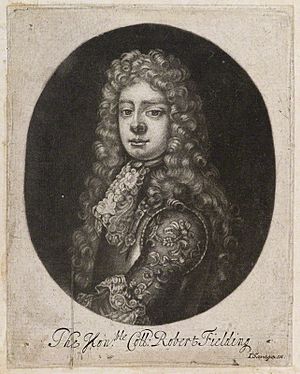Robert Fielding facts for kids
Robert Fielding (also known as Beau Fielding) lived from about 1650 to 1712. He was an English gentleman who was known for his lively lifestyle in the late 1600s and early 1700s. At the royal court of King Charles II, he was given the nicknames "Beau" and "Handsome" Fielding. He later married Barbara Villiers, who had been a close friend of the King.
Robert Fielding's Early Life
Fielding was born in a town called Solihull in Warwickshire, England. His father was George Fielding, who was related to the Earl of Denbigh. Not much is known about his mother.
A writer named Jonathan Swift mentioned a bit about Fielding's early life. Swift wrote that Fielding married a woman named Mary. She was the only daughter of Barnham Swift, who was the first Viscount Carlingford. Mary brought him a lot of land in Yorkshire. However, Fielding spent all of this money. He and Mary did not have any children. Later, he married Lady Margaret Burke. She was the daughter of Ulick Burke, the first Marquess of Clanricarde.
A Supporter of Kings
After King Charles II passed away in 1685, Robert Fielding became a strong supporter of King James II. King James II was a Roman Catholic. James gave Fielding a group of soldiers in the Royal Irish Army. While he was in Ireland, Fielding became a MP for Gowran. This area is in County Kilkenny. He was an MP in the 1689 Patriot Parliament.
It is said that Fielding used his soldiers to stop a Protestant protest. Later, there was a big change in power called the Glorious Revolution. King James II was forced to leave his throne. Fielding then traveled to Paris with the exiled king.
Fielding eventually returned to England. In 1696, he was put in Newgate Prison because he supported King James II. This support was known as Jacobitism. He received a special pardon the next year. After being released, he lived a very showy life. He spent his time gambling and was involved in duels.
When he was about 50 years old, Fielding had a duel with a lawyer named Fulwood. Fulwood was quicker and injured Fielding. Fulwood left feeling victorious. Fielding, however, showed his injuries to people. He hoped they would feel sorry for him. But instead, as Jonathan Swift wrote, "they all fell a-laughing."
 | Stephanie Wilson |
 | Charles Bolden |
 | Ronald McNair |
 | Frederick D. Gregory |


